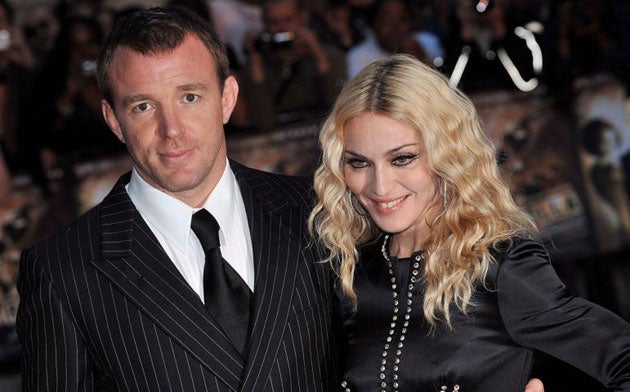Madonna sues over wedding pictures
Singer seeks £5m over 'stolen' images published by 'Mail on Sunday'

Madonna is claiming £5m damages from The Mail on Sunday after the newspaper admitted breach of privacy when it published private photographs taken at the singer's wedding to Guy Ritchie in Scotland eight years ago.
Pictures of the "wholly private" event held in the lavish setting of Skibo Castle in the Highlands were copied "surreptitiously" by an interior designer during work at her home in Beverly Hills, then sold to the newspaper, the singer's barrister, Matthew Nicklin, told the High Court yesterday.
No photographs of the marriage had been published anywhere in the world until the newspaper used 11 pictures over the front page and a double-page inside spread.
The court was told that Madonna, 50, who recently divorced Ritchie, 40, on the grounds of his unreasonable behaviour, was given no warning about the publication.
"She was ambushed, for the simple reason that if The Mail on Sunday had told her what they intended to do, the claimant would have sought and obtained an injunction," Mr Nicklin said.
The case is being heard by Mr Justice Eady – who was recently the subject of an outspoken attack by Paul Dacre, the editor-in-chief of the Daily Mail and The Mail on Sunday. He accused the judge of being partly responsible for allowing a privacy law through the back door.
After the pictures were published, Madonna launched legal proceedings seeking damages "in excess of £5m, being the estimated value of the photographs".
Mr Nicklin told Mr Justice Eady that the newspaper, which paid £5,000 for the pictures, "makes no attempt to defend what it did" and admitted breach of privacy and copyright. That admission led to the judge entering judgment in Madonna's favour on the issue of liability. Further proceedings to assess the damages to be paid are expected to be heard at the High Court next year.
The only photographs of the 2000 wedding were taken by renowned photographer Jean-Baptiste Mondino and presented to Madonna as a personal gift.
"The photographs, assembled by the claimant in an album, were a personal record of the event and kept by the claimant at her home," said Mr Nicklin.
"While the claimant was having interior work done on her home in Beverly Hills, one of the designers, Robert Joseph Wilber, surreptitiously gained access to the photograph album and copied at least 26 photographs."
It was now clear that, on 15 October 2008, a woman "who we now know is Bonnie Robinson" supplied 26 photographs to The Mail on Sunday – pictures that had "essentially been stolen by Mr Wilber from the claimant's home". The Mail on Sunday paid the go-between Ms Robinson, who lives in Los Angeles, "just £5,000".
The pictures used in the newspaper were cropped so that the fact that they were "photographs of photographs" was hidden from readers. "Readers were told nothing about the grubby way the photographs had essentially been stolen from the claimant's home and purchased by The Mail on Sunday from Ms Robinson," Mr Nicklin said, adding that although the newspaper had made admissions, it had not yet apologised to Madonna.
In November, Dacre, the editor-in-chief of Associated Newspapers, one of Britain's biggest media groups, said the "arrogant and amoral" judgments of Mr Justice Eady were "undermining the ability of newspapers to sell newspapers in an ever more difficult market".
The judge had used the privacy clause of the Human Rights Act against newspapers and their age-old freedom to expose the moral shortcomings of those in high places, Dacre told the Society of Editors conference in Bristol. "If Gordon Brown wanted to force a privacy law, he would have to set out a Bill, arguing his case in Parliament," Dacre said. "Now, thanks to the wretched Human Rights Act, one judge with a subjective and highly relativist moral sense can do the same with a stroke of his pen."
Mr Justice Eady did not comment. However, a spokesman for the Judicial Communications Office said: "Judges determine privacy cases in accordance with the law and the particular evidence presented by both parties. Any High Court judgment can be appealed."
Join our commenting forum
Join thought-provoking conversations, follow other Independent readers and see their replies
Comments